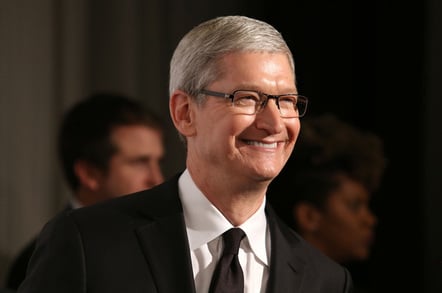Apple will start coughing up government app takedown demand stats

In its latest Transparency Report, covering government demands for customer and device data in the second half of 2017, Apple said that it will soon enumerate government app takedown requests.
“Starting with the Transparency Report period July 1 – December 31 2018, Apple will report on Government requests to take down Apps from the App Store in instances related to alleged violations of legal and/or policy provisions,” Apple’s report declared.
With the rise of cloud computing over a decade ago, law enforcement authorities recognized the value of data stored in cloud-oriented services. Tech companies, to signal the limits of their ability to deny lawful demands for data and encourage government moderation, began publishing transparency reports.
Transparency reports became fashionable in 2010 following Google’s “A new approach To China,” after its systems were subject to a cyberattack from China targeting its intellectual property and the Gmail accounts of Chinese human rights activists.
Twitter followed suit in 2012 and then, in the wake of the government surveillance disclosures arising from Edward Snowden and of litigation pushback against national security letter restrictions, the floodgates opened. As of last year, according to Google, there were at least 40 companies publishing transparency reports.
Apple, which has attempted to differentiate itself from Google by claiming that it’s more focused on privacy because it doesn’t focus on surveillance-based advertising, published its first transparency report in November 2013.
Since then, government information requests have surged, which in part can be attributed to rising device sales and increased account creation. For the first half of 2013, Apple reported 12,442 requests for device information by law enforcement agencies worldwide covering 36,464 specific devices.
In the second half of 2017, the number jumped to 29,718 requests covering 309,362 specific devices. During the first half of the year, there more fewer requests (30,814) covering fewer devices (233,052).
Apple, like just about every other tech company doing business in countries with restrictive media laws, faces ongoing pressure to comply with government censorship demands.
But where Google initially distanced itself from mainland China to avoid having to censor its search service (it crept back in recently), Apple could not resist the market’s iPhone sales potential and now find itself increasingly called upon to help authorities there prop up its censorship regime.
Toward that end, it removed 674 VPN apps from its iOS App Store in China last year at the behest of authorities. And recently, it began blocking iOS apps that used its CallKit API, which supports VoIP call integration.
Such kowtowing doesn’t do much for the company’s claimed commitment to privacy and human rights, which is something activist investors have tried unsuccessfully to correct.
But now that Apple will be reporting app-related takedown requests, at least there will be greater transparency into its legally mandated collaboration.
As for app removals in response to competitive concerns, such as Apple’s recent decision to disallow Value’s Steam Link app, or other company rule violations, don’t expect those to be mentioned in future Transparency Reports.
SOURCE:-.theregister